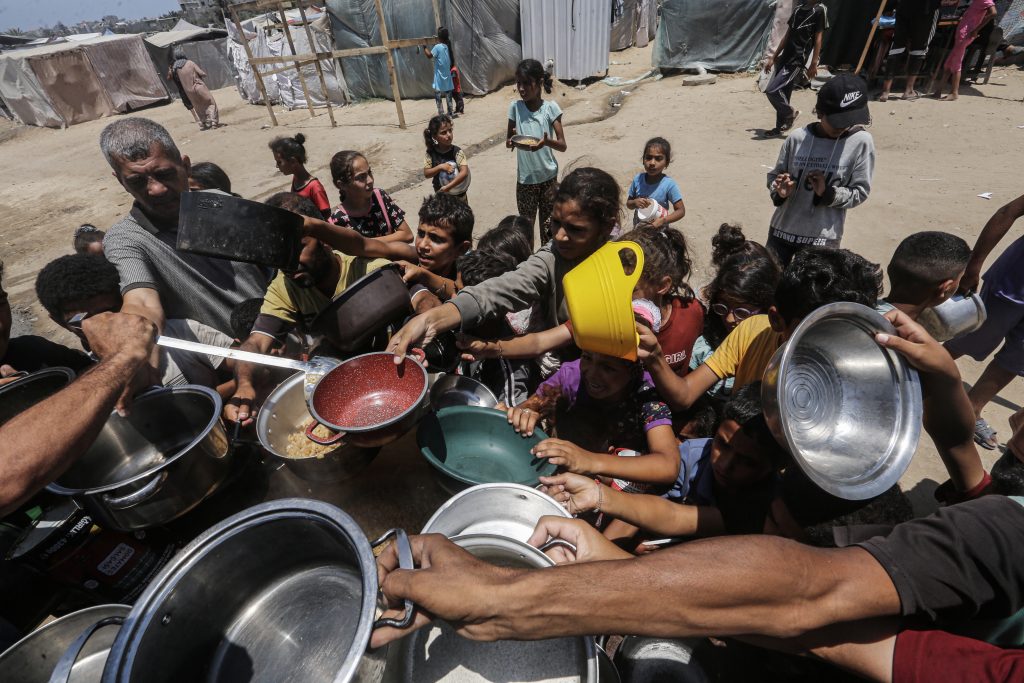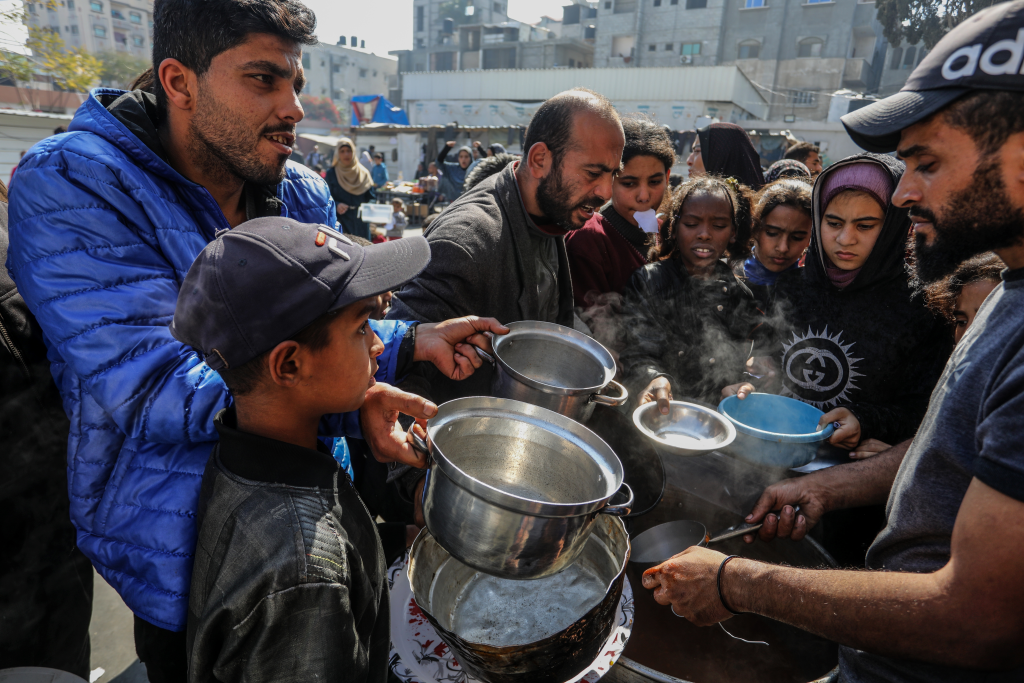Israel’s Starvation Policy in Gaza Is Forcing People to Eat Tree Leaves
PALESTINE - ISRAEL, 8 Jul 2024
Tareq S. Hajjaj | Mondoweiss - TRANSCEND Media Service

Displaced Palestinians, including children, receive a hot meal distributed by an aid organization in Zawaida, 27 Jun 2024. (Photo: Omar Ashtawy/APA Images)
The state of hunger in Gaza is growing. Its long-term health effects are starting to show.
3 Jul 2024 – Ahmad Abdulrahim, 38, strolled the remains of the markets in Gaza City with 150 Shekels in his pocket, the amount of money he used to feed his family of five for a week before the genocide. Today, that amount can hardly buy a single meal.
The markets, now little more than bombed-out remains, are empty of all basic needs, including vegetables, meat, and fruits. For the majority of people, such luxuries are unavailable except at unimaginable prices. Most vegetables, rare though they are, come from people’s gardens.
All Ahmad could find were cleaning supplies and canned foods. Ahmad told Mondoweiss that due to his children’s long-term dependence on these foods, they’ve started to develop health problems. After a protracted search, Ahmad found some zucchini; he walked faster when he noticed the seller, who had placed them in a small pile on the ground on top of a plastic bag. When he asked about the price, he was surprised to know that one kilogram of zucchini cost 80 Shekels ($20). Before the war, it used to be 3 shekels per kilo (less than a dollar).
Such was the price for most other vegetables that could be found. One kilo of green peppers cost 250 shekels ($66), where it used to be 5 ($1.4). One kilo of cucumber and tomato cost 90-100 shekels ($23-$26), which used to be 2-3 shekels (53-80 cents).
Ahmad said that as he walked back home, disappointed, he was dreading his family’s reaction when they found out that he spent almost half of their money on two cans of beans.
“I’m starting to deal with my kids as adults,” he said. “I’m telling them this is war, and our enemy wants us to starve. I’m telling them that we should be thankful that we have been able to survive so far. I promise them that when this war ends, I will bring them whatever they want.”

Palestinian charitable organizations, with European support, distribute food “takiya” to displaced people in schools in the city of Rafah in the southern Gaza Strip, on 20 Feb 2024.
(Shutterstock)
The state of starvation in Gaza has not ended. In northern Gaza, it has dramatically increased, but in ways that are different from how it was at the war’s outset. Protracted periods of malnutrition and deprivation from vital nutrients are having a cumulative impact on Gaza’s population, especially for those who most need it, such as children and pregnant women.
“Before this crisis, there was enough food in Gaza to feed the population,” WHO Director-General Dr. Tedros Adhanom Ghebreyesus said back in March. “Malnutrition was a rare occurrence. Now, people are dying, and many more are sick. Over a million people are expected to face catastrophic hunger unless significantly more food is allowed to enter Gaza.”
Only 0.8% of children under the age of five were suffering from acute malnutrition before the war, the WHO also said. By February, that figure had jumped to 12.4% – 16.5%.
Ever since those numbers were reported, Israel’s genocidal war has only worsened the systematic deprivation of food to the population. But Israeli propaganda would have us believe that there is no famine, and there is no Israeli policy of deliberate starvation. Many Israeli media outlets misleadingly focus on technical definitions of what constitutes a famine and dishonestly misquote passages from the UN’s ICP reports on conditions in Gaza.
The reality on the ground tells an opposite story, one in which the systematic deprivation of Gaza’s population from sources of nutrition is leading to long-term consequences. Gaza health officials and medical workers have already observed it for weeks.
Hussam Abu Safia, Director of Kamal Adwan Hospital, told Aljazeera that the specter of famine was once again sweeping northern Gaza, stressing that the lack of availability of foods with diverse nutritional values will have a long-term impact on the population. Since the start of the Israeli army’s second invasion of the Shuja’iyya neighborhood in Gaza City last week, access of residents in northern Gaza to food has only worsened.
Read also: The second invasion of al-Shuja’iyya is a war of attrition
Abu Safia said that no basic materials have entered the northern Gaza Strip for weeks, leaving flour as the only available staple. This is far from sufficient to meet the nutritional needs of children, the elderly, and pregnant women, all of whom require fats and proteins, Abu Safia asserted.
“Within 14 days, 214 children have arrived at the hospital showing signs of malnutrition,” Abu Safiya told Al Jazeera well before the second invasion of Shuja’iyya began. “Including over 50 cases of advanced malnutrition and 6 cases in critical condition in the intensive care unit.”
“These children are living solely on fluid replacements, and we do not have any milk or special food for them, which puts their lives at risk,” he said.
Eating tree leaves
People in the north of Gaza can tell that this wave of hunger is the worst to visit the strip so far, leaving many wondering about their prospects for survival if these conditions do not change.
Some residents of Gaza City have resorted to using tree leaves, such as mulberry leaves, to prepare dawali, a dish typically comprised of fragrant rice wrapped in grape leaves.
“People are cooking weeds,” Mahmoud Issa, a local journalist and resident of Gaza City, told Mondowiess shortly before the Shuja’iyya invasion. “They cook leaves in water and spices. Even using the water is risky, because there’s no power to run the desalination plants.”
“Solar power is no longer available in Gaza either. Israeli drones have systematically targeted every solar panel on every roof across Gaza. They want people to lose hope and starve,” he continued.
Issa explained that people believe expired canned foods, when made available in Gaza, are making their children sick. This has led some to try to avoid such foods for fear that they would not be able to get treatment for their kids should they fall ill, given that northern Gaza no longer has any health system to speak of.
“Families know there is no way to treat their children if they get poisoned, so they are abandoning canned foods,” he said.
But even though cases of food poisoning due to the consumption of expired food products have been reported in Gaza, reports are also emerging of additional cases of food poisoning from forage eating.
Fruits, vegetables, chicken, meat, and fish are all unavailable in Gaza, Mahmoud explained.
“Three months ago, the Israeli checkpoint in the Kuwaiti Square was closed, and the checkpoint in al-Rasheed Street was closed, too,” he said. “The Israeli army allows the entrance of food trucks from the Erez crossing, but that is not enough for the population in northern Gaza.”
“When the Rafah crossing was working, over 60 trucks used to arrive, including frozen vegetables, meat, chicken, and other necessary food,” he explained. “We could survive then. It was tolerable. But now every crossing is closed, and people have started to starve.”
________________________________________________
Tareq S. Hajjaj is the Mondoweiss Gaza Correspondent, and a member of the Palestinian Writers Union. He studied English Literature at Al-Azhar University in Gaza and started his career in journalism in 2015 working as a news writer and translator for the local newspaper Donia al-Watan. He has reported for Elbadi, Middle East Eye, and Al Monitor.
Go to Original – mondoweiss.net
Tags: Anglo America, Colonialism, Crimes against Humanity, Ecocide, Ethnic Cleansing, Famine, Gaza, Genocide, Genocide Convention, Hamas, Hunger, International Court of Justice ICJ, International Criminal Court ICC, Israel, Israeli Apartheid, Israeli occupation, Massacre, Palestine, Protests, Rafah, Students Anti-Genocide Gaza, USA, United Nations, War crimes, West Bank, Zionism
Join the BDS-BOYCOTT, DIVESTMENT, SANCTIONS campaign to protest the Israeli barbaric siege of Gaza, illegal occupation of the Palestine nation’s territory, the apartheid wall, its inhuman and degrading treatment of the Palestinian people, and the more than 7,000 Palestinian men, women, elderly and children arbitrarily locked up in Israeli prisons.
DON’T BUY PRODUCTS WHOSE BARCODE STARTS WITH 729, which indicates that it is produced in Israel. DO YOUR PART! MAKE A DIFFERENCE!
7 2 9: BOYCOTT FOR JUSTICE!
DISCLAIMER: The statements, views and opinions expressed in pieces republished here are solely those of the authors and do not necessarily represent those of TMS. In accordance with title 17 U.S.C. section 107, this material is distributed without profit to those who have expressed a prior interest in receiving the included information for research and educational purposes. TMS has no affiliation whatsoever with the originator of this article nor is TMS endorsed or sponsored by the originator. “GO TO ORIGINAL” links are provided as a convenience to our readers and allow for verification of authenticity. However, as originating pages are often updated by their originating host sites, the versions posted may not match the versions our readers view when clicking the “GO TO ORIGINAL” links. This site contains copyrighted material the use of which has not always been specifically authorized by the copyright owner. We are making such material available in our efforts to advance understanding of environmental, political, human rights, economic, democracy, scientific, and social justice issues, etc. We believe this constitutes a ‘fair use’ of any such copyrighted material as provided for in section 107 of the US Copyright Law. In accordance with Title 17 U.S.C. Section 107, the material on this site is distributed without profit to those who have expressed a prior interest in receiving the included information for research and educational purposes. For more information go to: http://www.law.cornell.edu/uscode/17/107.shtml. If you wish to use copyrighted material from this site for purposes of your own that go beyond ‘fair use’, you must obtain permission from the copyright owner.
Join the discussion!
We welcome debate and dissent, but personal — ad hominem — attacks (on authors, other users or any individual), abuse and defamatory language will not be tolerated. Nor will we tolerate attempts to deliberately disrupt discussions. We aim to maintain an inviting space to focus on intelligent interactions and debates.
Read more
Click here to go to the current weekly digest or pick another article:
PALESTINE - ISRAEL: